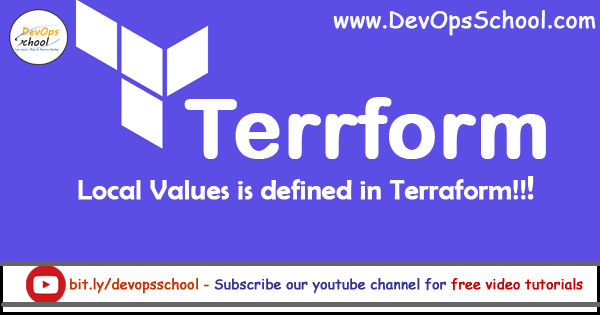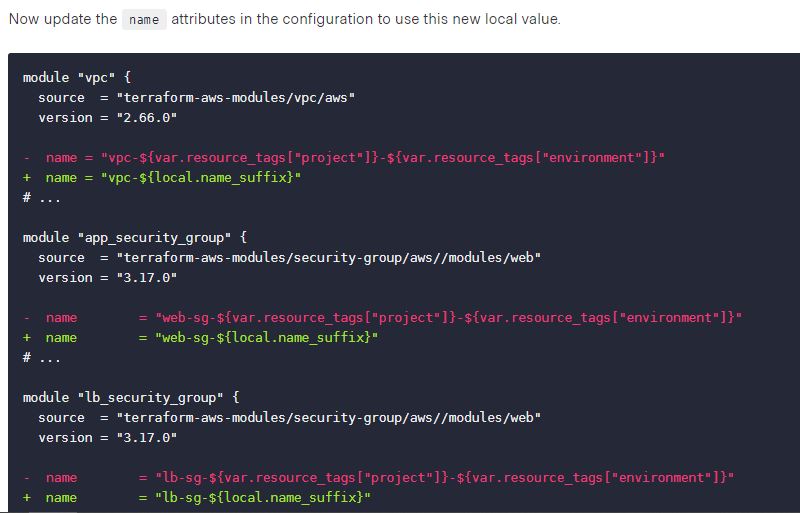
What is local value in terraform?
In Terraform, a locals block is used to define local variables within a module, allowing you to create reusable expressions and reduce duplication in your code.
In Terraform, the locals block is used to define local variables that store values which can be referenced throughout the configuration. These variables cannot be overridden like input variables (variable block) and help in making code cleaner, reusable, and maintainable.
Remember
- Scope is Within a module
Local values can be used to simplify complex expressions or to make your code more readable by giving a name to a value that is used multiple times within a module. Additionally, local values can be used to reduce the amount of redundant code in your module by allowing you to define common values in one place and use them throughout your code.
These are variables that are local to a module. They are defined, assigned, and used in the same module, and defined in the “locals” block. Below is an example snippet on a local block:
Local variables can be declared once and used any number of times in the module. These can be accessed as objects by using the format of “local.Variable_Name”.
Unlike variables found in programming languages, Terraform’s locals don’t change values during or between Terraform runs such as plan, apply, or destroy. You can use locals to give a name to the result of any Terraform expression, and re-use that name throughout your configuration. Unlike input variables, locals are not set directly by users of your configuration.
Set of related local values can be declared together in a single locals block. The expressions assigned to local value names can either be simple constants or can be more complex expressions that transform or combine values from elsewhere in the module.
Example
locals {
service_name = "DDDDDDDDDDDDDDDDDDDDDDDDDDDDDD"
owner = "Community Team"
}
locals {
project_name = "my-terraform-project"
instance_type = "t2.micro"
tags = {
environment = "dev"
owner = "team-a"
}
}
resource "github_repository" "example" {
name = local.service_name
description = "My awesome codebase"
visibility = "public"
}
🔹 Each variable inside locals {} is an immutable expression.
🔹 Can be strings, numbers, lists, maps, or complex objects.Comparing modules to functions in a traditional programming language:
- Input variables are analogous to function arguments and
- Outputs values are analogous to function return values, then
- local values are comparable to a function’s local temporary symbols.
When To Use Local Values?
✅ Avoid Repetitive Code: Define values once and reuse them.
✅ Complex Expressions: Store calculated values or concatenations.
✅ Maintainability: Improves readability of Terraform code.
- Local values can be helpful to avoid repeating the same values or expressions multiple times in a configuration, but if overused they can also make a configuration hard to read by future maintainers by hiding the actual values used.
- Use local values only in moderation, in situations where a single value or result is used in many places and that value is likely to be changed in future. The ability to easily change the value in a central place is the key advantage of local values.
- Each locals block can have as many locals as needed, and there can be any number of locals blocks within a module. The names given for the items in the local block must be unique throughout a module. The given value can be any expression that is valid within the current module.
- The expression of a local value can refer to other locals, but as usual reference cycles are not allowed. That is, a local cannot refer to itself or to a variable that refers (directly or indirectly) back to it.
# Using Local strings Values in Resources
locals {
common_tags = {
project = "web-app"
owner = "DevOpsTeam"
}
}
resource "aws_instance" "web" {
ami = "ami-123456"
instance_type = "t3.micro"
tags = local.common_tags
}
# Using Local strings Values in Resources
locals {
bucket_name = "my-app-bucket-${terraform.workspace}"
}
resource "aws_s3_bucket" "example" {
bucket = local.bucket_name
}
# Using Local strings Values in Resources
locals {
instance_count = var.environment == "prod" ? 3 : 1
}
resource "aws_instance" "web" {
count = local.instance_count
ami = "ami-123456"
instance_type = "t2.micro"
}
# Using locals with Maps & Lists
locals {
db_configs = {
"dev" = { instance_type = "db.t3.micro", storage = 20 }
"prod" = { instance_type = "db.t3.large", storage = 100 }
}
}
resource "aws_db_instance" "database" {
instance_class = local.db_configs[var.environment].instance_type
allocated_storage = local.db_configs[var.environment].storage
}
Comparison between local variable and input variable
Here’s a comparison between local variables and input variables in Terraform, highlighting their key differences and use cases:
| Feature | Local Variables | Input Variables |
|---|---|---|
| Definition | Defined using the locals block. | Defined using the variable block. |
| Scope | Local to the module where they are defined. | Can be passed from outside the module, typically from the root module. |
| Purpose | Simplify and reuse complex expressions and values within a module. | Allow dynamic configuration by providing input from users or higher-level modules. |
| Syntax | hcl locals {<br> var_name = "value"<br>} | hcl variable "var_name" {<br> default = "value"<br>} |
| Value Assignment | Directly assigned within the locals block. | Assigned via command-line arguments, environment variables, or terraform.tfvars files. |
| Usage | hcl local.var_name | hcl var.var_name |
| Flexibility | Fixed within the module; cannot be overridden from outside. | Flexible and can be overridden from the command line, environment variables, or files. |
| Example Use Case | Consolidating repeated expressions or values within a module to reduce redundancy and enhance readability. | Allowing users to specify parameters like region, instance type, or environment to customize the deployment. |
| Reusability | Limited to the scope of the module; not reusable across modules. | Highly reusable across different modules by passing different values for the variables. |

📌 locals vs. variables vs. outputs
| Feature | locals | variables | outputs |
|---|---|---|---|
| Purpose | Store reusable values inside Terraform code | Accept user-defined values | Display values after Terraform execution |
| Mutable? | No (Fixed during execution) | Yes (Can be overridden) | No |
| Scope | Local to the module | Passed from CLI or other modules | Only available after execution |
| Example | local.project_name | var.region | output "vpc_id" { value = aws_vpc.main.id } |

📌 When NOT to Use locals
❌ When you need input from users → Use variable block instead.
❌ When you want cross-module communication → Use outputs.
❌ If the value is very simple and used only once → Define it inline instead.
Example 1 Program
# This is a DRAFT and not yet implemented; final syntax/behavior may differ
locals {
config = {
region = "${var.region}"
# ...and any other settings you want to make available to modules...
}
}
module "example" {
source = "./example"
# pass the whole config object in a single variable
config = "${local.config}"
}Example 2 –
Example 2 -
locals {
service_name = "forum"
owner = "Community Team"
}
locals {
# Ids for multiple sets of EC2 instances, merged together
instance_ids = concat(aws_instance.blue.*.id, aws_instance.green.*.id)
}
locals {
# Common tags to be assigned to all resources
common_tags = {
Service = local.service_name
Owner = local.owner
}
}
resource "aws_instance" "example" {
# ...
tags = local.common_tags
}
Example 3 – Terraform workspaces and locals for environment separation
provider "aws" {
region= "us-east-1"
}
resouce "aws_instance" "my_service" {
ami="ami-7b4d7900"
instance_type="t2.micro"
}
$ terraform workspace new production
provider "aws" {
region= "us-east-1"
}
locals {
env="${terraform.workspace}"
counts = {
"default"=1
"production"=3
}
instances = {
"default"="t2.micro"
"production"="t4.large"
}
instance_type="${lookup(local.instances,env)}"
count="${lookup(local.counts,local.env)}"
}
resource "aws_instance" "my_service" {
ami="ami-7b4d7900"
instance_type="${local.instance_type}"
count="${local.count}"
}Example 4 –
##----------------------
## Terraform: Local ##
##----------------------
## Create a directory and get inside it
mkdir terraform && cd terraform
## Create resources
vi main.tf
------------------
#declare variable
variable "name" {
default = "myapp"
}
#aws provider
provider "aws" {
access_key = "<your_access_key>"
secret_key = "<your_secret_key>"
region = "ap-south-1"
}
#get region details
data "aws_region" "myregion" {}
#get availability zone details
data "aws_availability_zones" "myavailabilityzones" {}
#get account details
data "aws_caller_identity" "myidentity" {}
#declare local
locals {
tag_prefix = "${var.name}_${data.aws_caller_identity.myidentity.account_id}_${data.aws_region.myregion.name}"
}
#create vpc
resource "aws_vpc" "myvpc" {
cidr_block = "10.0.0.0/16"
enable_dns_hostnames = true
tags {
Name = "${local.tag_prefix}_vpc" #local block called
}
}
#create subnet
resource "aws_subnet" "myvpc_subnet" {
vpc_id = "${aws_vpc.myvpc.id}"
cidr_block = "10.0.0.0/24"
availability_zone = "${data.aws_availability_zones.myavailabilityzones.names[0]}"
tags {
Name = "${local.tag_prefix}_subnet" #local block called
}
}
------------------
## Format code
terraform fmt
## Initialize terraform
terraform init
## Create the resource
terraform apply
## Show state
terraform show
## Cleanup
## Destory resources
terraform destory
## Remove terraform directory
cd .. && rm -rf terraformI’m a DevOps/SRE/DevSecOps/Cloud Expert passionate about sharing knowledge and experiences. I am working at Cotocus. I blog tech insights at DevOps School, travel stories at Holiday Landmark, stock market tips at Stocks Mantra, health and fitness guidance at My Medic Plus, product reviews at I reviewed , and SEO strategies at Wizbrand.
Do you want to learn Quantum Computing?
Please find my social handles as below;
Rajesh Kumar Personal Website
Rajesh Kumar at YOUTUBE
Rajesh Kumar at INSTAGRAM
Rajesh Kumar at X
Rajesh Kumar at FACEBOOK
Rajesh Kumar at LINKEDIN
Rajesh Kumar at PINTEREST
Rajesh Kumar at QUORA
Rajesh Kumar at WIZBRAND

